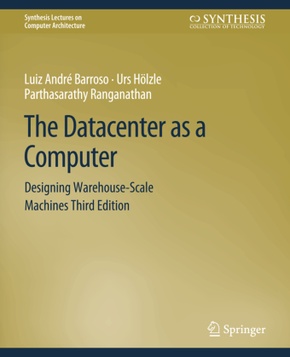The Datacenter as a Computer - Designing Warehouse-Scale Machines, Third Edition
| Verlag | Springer |
| Auflage | 2018 |
| Seiten | 189 |
| Format | 19,1 x 1,1 x 23,5 cm |
| Gewicht | 399 g |
| Artikeltyp | Englisches Buch |
| Reihe | Synthesis Lectures on Computer Architecture |
| ISBN-10 | 303100633X |
| EAN | 9783031006333 |
| Bestell-Nr | 03100633A |
This book describes warehouse-scale computers (WSCs), the computing platforms that power cloud computing and all the great web services we use every day. It discusses how these new systems treat the datacenter itself as one massive computer designed at warehouse scale, with hardware and software working in concert to deliver good levels of internet service performance. The book details the architecture of WSCs and covers the main factors influencing their design, operation, and cost structure, and the characteristics of their software base. Each chapter contains multiple real-world examples, including detailed case studies and previously unpublished details of the infrastructure used to power Google's online services. Targeted at the architects and programmers of today's WSCs, this book provides a great foundation for those looking to innovate in this fascinating and important area, but the material will also be broadly interesting to those who just want to understandthe infra structure powering the internet.
The third edition reflects four years of advancements since the previous edition and nearly doubles the number of pictures and figures. New topics range from additional workloads like video streaming, machine learning, and public cloud to specialized silicon accelerators, storage and network building blocks, and a revised discussion of data center power and cooling, and uptime. Further discussions of emerging trends and opportunities ensure that this revised edition will remain an essential resource for educators and professionals working on the next generation of WSCs.
Inhaltsverzeichnis:
Acknowlegements.- Introduction.- Workloads and Software Infrastructure.- WSC Hardware Building Blocks.- Data Center Basics: Building, Power, and Cooling.- Energy and Power Efficiency.- Modeling Costs.- Dealing with Failures and Repairs.- Closing Remarks.- Bibliography.- Author Biographies.

